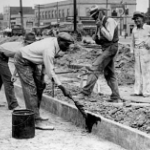
That may seem obvious; it’s in the words, after all.
But it’s really not that way at all.
A helluva a lot of the “public” infrastructure of the United States is actually private property.
For example, I live in Northern California where you may have heard we’re having a bit of a kerfuffle about the local electrical (and gas) company Pacific Gas & Electric. Now, PG&E is a private company, though a publicly-traded one, but we are completely dependent on them to function as a society.
Nothing works without the electrical grid.
Almost everything just kinda drifts to a halt, as I can attest from personal experience when PG&E decided last fall to shut off power to much of our county (and the neighboring counties as well) for much of a week to reduce their liability risk for having dangerous levels of “deferred maintenance”.
The corridor around the major highway was lit up, and functioning, but everywhere else pretty much everything stopped: schools were closed, so were businesses and government offices. I have kids, so I was kept pretty busy, but I expect if I hadn’t there wouldn’t have been much to do but read a book and refill the generator occasionally.
I couldn’t go outside much; the air was full of smoke from a wildfire started by PG&E equipment …
Not that everyone had generators.
A lot of folks (and businesses) lost an awful lot of stored food in that week too.
This is no way to run a railroad. Or a society.
We need to fix this; soon.
The infrastructure on which the public (res publica, literally “the public thing”) depends must be run for the benefit of the public. Having our fundamental infrastructure decisions made to protect the private profits of a company’s shareholders is completely unacceptible.
This system, all of these systems, on which we depend need to be nationalized (or whatever the word is when it’s a state, not a nation, doing it) and converted into utility districts that are owned by and responsible to the people who are dependent on them.
PG&E is bankrupt.
It shouldn’t even cost much to take them over. Hell, their liabilities are so high at this point you could make a fair case that the company is worth literally nothing.
- Bad Politics: Welcome To The Jungle Primary - 2026-02-16
- AIpocalypse: Generative AI Cannot Be Reliable - 2026-02-13
- C’mon Democrats: Zero Votes For Fascism - 2026-02-11
- Tax Everyone: No More Religious Exemptions
- AIpocalypse: Generative AI Cannot Be Reliable
- You Should Read This: We Should Talk About The Morality of Political Violence
- “History And Tradition”: If We’re Changing Legal Interpretation, Let’s Not Make It Worse
- The Asshole Window: A New Theory Of Societal Collapse
